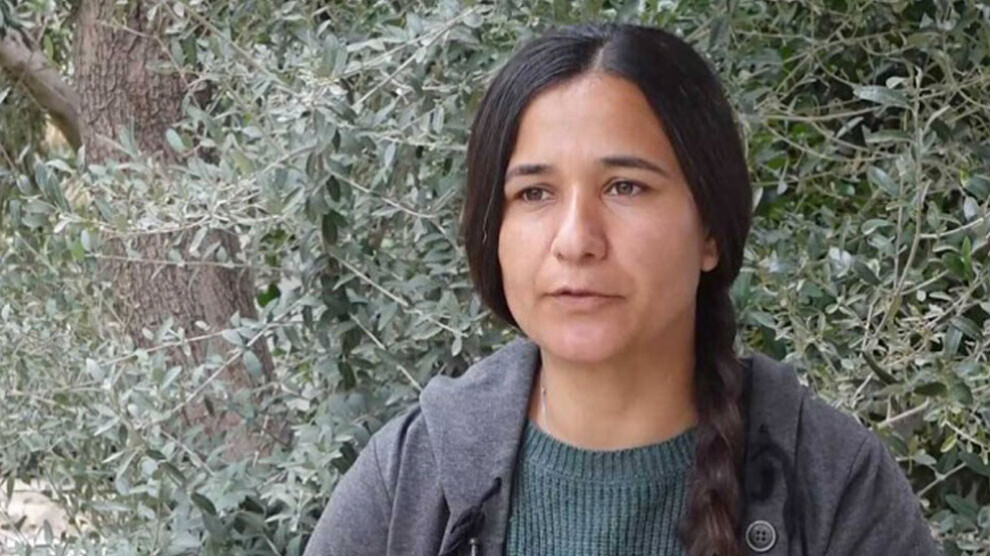Appeal from Maxmur to the UN
Filiz Budak, co-chair of the People's Council of the self-administered Maxmur refugee camp, appeals to the United Nations to live up to its responsibility and take a stand against the Turkish attacks.
Filiz Budak, co-chair of the People's Council of the self-administered Maxmur refugee camp, appeals to the United Nations to live up to its responsibility and take a stand against the Turkish attacks.

About 12,000 people live in the self-administered Maxmur refugee camp in southern Kurdistan (northern Iraq), most of whom have fled from northern Kurdistan (southeastern Turkey). Among the residents are old and sick people, but also children. There are 3,500 school-age children alone. The refugee camp, which is officially supported by the UN, is not only attacked by the Turkish air force and the ISIS, but it has also been under an embargo for three years by South Kurdistan’s ruling party KDP, which collaborates with Turkish fascism. The co-chair of the People's Council of Maxmur, Filiz Budak, talked to the Mezopotamya news agency about their demand for the UN to do its job and take a stand against attacks and the embargo.
Most recently, on 1 February, the Turkish air force killed nine people and injured many others in simultaneous attacks on Maxmur, Şengal, Şehba and Dêrik. Regarding the attacks, Budak said, "Everyone in the camp was on their feet until morning on the night of the Turkish attacks. Although the bombardments continued, people went outside to recover the injured. This shows great determination. People waited until morning in front of the hospitals and at the sites of the bombings. This people have shown that they will resist at any cost."
"They want to drive people out of the camp"
As to the reasons for the attacks, Budak said: "Our camp is a world-renowned refugee camp. We have been living here for 27 years. The mothers, fathers, siblings and relatives of people who were murdered by the Turkish state live in this camp. People whose villages were burnt down by the Turkish state live here. Turkey wants to expel the people from the camp. When regimes want to change demographics and destroy a society, they first force people to flee. By fleeing, this society is removed from its land and culture. Their language is changed, and the new generations grow up according to the conditions of the place of flight. They are concerned with completely ending the existence of this society. Prostitution, drug abuse, etc. are used to completely remove this society from its essence and take away its identity. In this way, Turkey is trying to take away the identity of the people, but this policy has failed. The people have organised themselves and built their own system. By shaping their lives based on their own system, the people have protected both their culture and their identity."
Maxmur: "A fortress of Kurdish identity"
On the importance of Maxmur, Budak stated: "Here the children grow up in defiance of the state, which denies their identity and language. Maxmur camp is a fortress of Kurdish identity.”
Recalling the ISIS attack on the camp in 2014, Budak said, "Despite everything, ISIS received the first blows that led to its defeat in Maxmur, Şengal and Rojava. Turkey's attacks on Maxmur have continued since 2017. There are 12,000 people living in the camp. There are elderly people, there are sick people and children. There are 3,500 children and young people of school age alone. As if the attacks were not enough, there has been an embargo on our camp for three years."
"The Iraqi government is silent"
Regarding the current attempts by the Iraqi government to fence the camp with barbed wire, the council representative explained: "They wanted to make us prisoners by erecting watchtowers around our camp. Our residents clearly spoke out against this initiative and took to the streets. They made it clear that they would not accept this. When these attempts failed, Turkey's air strikes began immediately afterwards. The Iraqi government is silent about these attacks. If the Iraqi government wants to show that it is not involved in these attacks, it must close its airspace to Turkey."
"The UN only cares about its personnel"
Budak stated that in 2014, when ISIS attacked, the UN withdrew its staff from the camp and since then only the UN building has been in the camp. Budak added: "Instead of thinking about how to ensure the safety of the 12,000 people in the camp, the UN, considering the safety of a few of its staff, does not consider it possible to send them to the camp. The UN limited itself to half-hearted statements about the attacks on our camp. The UN building in the camp must not be left empty. It must fulfil its function. The UN must now clarify its position. They must be clear about what they will do for the camp and how they will fulfil their responsibility for the security of the camp."